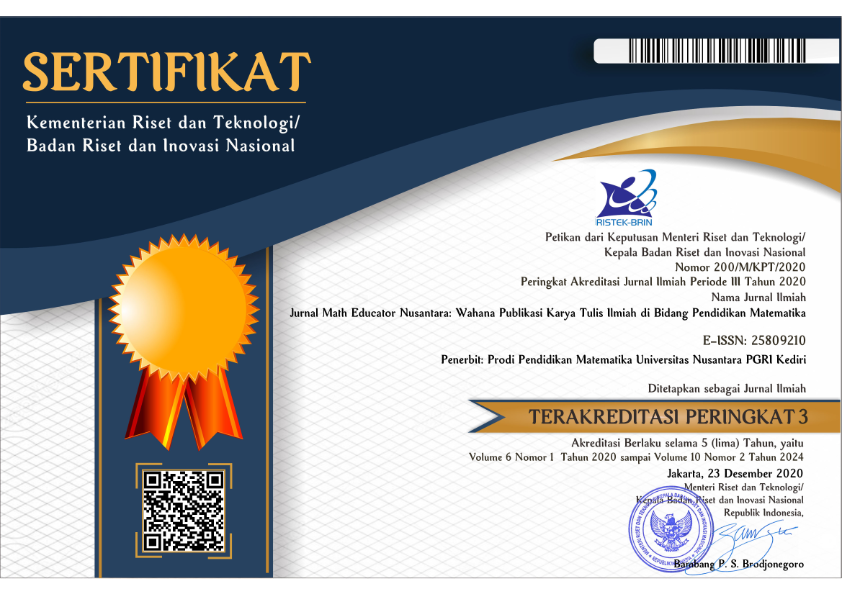Realistic Mathematics Education Model for Logical Reasoning of Primary Students
DOI:
https://doi.org/10.29407/jmen.v10i2.22275Keywords:
Logical reasoning, RME model, primary school studentsAbstract
Logical reasoning for primary school students is still relatively low. Meanwhile, primary school students need logical reasoning to solve problems based on reasonable facts. Realistic mathematics education (RME) model is thought to improve students' logical reasoning. The purpose of the study was to examine the effect of RME model on logical reasoning of primary school students. A quasi-experimental design with one group pretest-posttest was applied as the research design. Meanwhile, the research sample was taken in one of the public primary schools in Sidoarjo, which was randomly selected. Data analysis techniques used descriptive and inferential. The results showed a difference in the average pretest and posttest scores on logical reasoning. Meanwhile, the paired t-test result of 0.000 <0.05 provides evidence that there is indeed a substantial relationship between the application of the RME model and the improvement of logical reasoning skills of primary school students. Thus, the RME model significantly affects the logical reasoning of primary school students.
References
Albay, E. M. (2019). Analyzing the effects of the problem solving approach to the performance and attitude of first year university students. Social Sciences and Humanities Open, 1(1), 100006. https://doi.org/10.1016/j.ssaho.2019.100006
Bronkhorst, H., Roorda, G., Suhre, C., & Goedhart, M. (2022). Research in mathematics education students ’ use of formalizations for improved logical reasoning reasoning. Research in Mathematics Education, 24(3), 291–323. https://doi.org/10.1080/14794802.2021.1991463
Chang, C. Y., Kao, C. H., & Hwang, G. J. (2020). Facilitating students’ critical thinking and decision making performances: A flipped classroom for neonatal health care training. Educational Technology and Society, 23(2), 32–46. https://www.jstor.org/stable/26921132
Cindyana, E. A., Alim, J. A., & Noviana, E. (2022). Pengaruh pembelajaran berdiferensiasi berbantuan materi ajar geometri berbasis rme terhadap kemampuan penalaran matematis siswa kelas 3 sekolah dasar. JURNAL PAJAR (Pendidikan Dan Pengajaran), 6(4), 1179. https://doi.org/10.33578/pjr.v6i4.8837
Da, N. T. (2022). Designing a teaching model based on the Realistic Mathematics Education (RME) approach and its application in teaching calculus. Journal of Mathematics and Science Teacher, 2(1), em006. https://doi.org/10.29333/mathsciteacher/11918
Devi, M. S. A., & Amir, M. F. (2021). Analisis kesalahan konseptual dan prosedural siswa sekolah dasar dalam menggeneralisasi pola bilangan. AKSIOMA: Jurnal Program Studi Pendidikan Matematika, 10(3), 1336. https://doi.org/10.24127/ajpm.v10i3.3713
Dos Santos, C. F. (2021). Intuitions, theory choice and the ameliorative character of logical theories. Synthese, 199(5–6), 12199–12223. https://doi.org/10.1007/s11229-021-03329-8
Duyen, N. T. H., & Loc, N. P. (2022). Developing primary students’ understanding of mathematics through mathematization: a case of teaching the multiplication of two natural numbers. European Journal of Educational Research, 11(3), 1–16. https://doi.org/https://doi.org/10.12973/eu-jer.11.1.1
Ekowati, D. W., Azzahra, F. Z., Saputra, S. Y., & Suwandayani, B. I. (2021). Realistic mathematics education (RME) approach for primary school students’ reasoning ability. Premiere Educandum : Jurnal Pendidikan Dasar Dan Pembelajaran, 11(2), 269. https://doi.org/10.25273/pe.v11i2.8397
Febrian, F., & Astuti, P. (2018). The RME principles on geometry learning with focus of transformation reasoning through exploration on Malay woven motif. Journal of Turkish Science Education, 15(Special Issue), 33–41. https://doi.org/10.12973/tused.10254a
Hamzah, H., Hamzah, M. I., & Zulkifli, H. (2022). Systematic literature review on the elements of metacognition-based higher order thinking skills (HOTS) teaching and learning modules. Sustainability (Switzerland), 14(2), 1–15. https://doi.org/https://doi.org/10.3390/su14020813
Heard, J., Scoular, C., Duckworth, D., Ramalingam, D., & Teo, I. (2020). Critical thinking : Skill development framework. Australian Council for Educational Research, September 2021, 1–23. https://research.acer.edu.au/ar_misc/41/
Hidajat, F. A. (2021). Students creative thinking profile as a high order thinking in the improvement of mathematics learning. European Journal of Educational Research, 10(3), 1247–1258. https://eric.ed.gov/?id=EJ1307347
Khotimah, R. P., & Masduki. (2019). Improving reasoning ability through contextual teaching and learning in differential equations. Journal of Physics. https://doi.org/10.1088/1742-6596/1265/1/012017
Latip, A., Turmudi, T., & Yulianti, K. (2023). Analysis of mathematical reasoning ability reviewed based on the level of mathematical anxiety. Jurnal Analisa, 9(1), 1–11. https://doi.org/10.15575/ja.v9i1.22828
Lerman, S. (2020). Encyclopedia of Mathematics Education. https://link.springer.com/referenceworkentry/10.1007/978-3-030-15789-0_170
Lestari, W., & Jailani. (2018). Enhancing an ability mathematical reasoning through metacognitive strategies. Journal of Physics: Conference Series, 1097(1). https://doi.org/10.1088/1742-6596/1097/1/012117
Lin, C. (2023). The development of student’s thinking ability in arithmetic cognitive. In Intellectual Development and Mathematics Learning. https://doi.org/10.1007/978-981-19-8757-1
Md, M. R. (2019). 21st century skill “Problem solving”: Defining the concept. Asian Journal of Interdisciplinary Research, 2(1), 64–74. https://doi.org/10.34256/ajir1917
Morsanyi, K. (2020). Reasoning skills in individuals with mathematics difficulties. In Handbook of Educational Psychology and Students with Special Needs. https://doi.org/10.4324/9781315100654-18
Moschella, M., & Basso, D. (2020). Computational thinking, spatial and logical skills. An investigation at primary school. Ricerche Di Pedagogia e Didattica – Journal of Theories and Research in Education, 15(2), 69–89. https://doi.org/10.6092/issn.1970-2221/11583
O’Ijayevna, O. F. (2020). The development of logical thinking of primary school students in mathematics. European Journal of Research and Reflection in Educational Sciences, 8(2), 235–239. https://www.idpublications.org/wp-content/uploads/2020/03/Full-Paper-THE-DEVELOPMENT-OF-LOGICAL-THINKING-OF-PRIMARY-SCHOOL-STUDENTS-IN-MATHEMATICS.pdf
Odina, I., & Stavicka, A. (2022). Concept formation for enhancing students’ analytical, creative, and critical thinking skills. In Edureform Handbook for Innovative Pedagogy (pp. 60–68). https://www.edureform.eu/wp-content/uploads/2023/07/EDUREFORM-manual_compressed-1.pdf#page=60
Pamungkas, A. S., & Masduki, M. (2022). Student’s logical reasoning ability in terms of sequential thinking style. Kreano, Jurnal Matematika Kreatif-Inovatif, 13(2), 257–268. https://doi.org/10.15294/kreano.v13i2.37421
Purnamatati, A. M. M., Usman, H., & Yunianingsih, E. (2023). Influence a realistic mathematics education approach and motivation on students’ mathematical reasoning ability. Journal of Instructional Mathematics, 4(1), 13–20. https://doi.org/10.37640/jim.v4i1.1618
Saleh, M., Prahmana, R. C. I., Isa, M., & Murni. (2018). Improving the reasoning ability of elementary school student through the indonesian realistic mathematics education. Journal on Mathematics Education, 9(1), 41–54. https://eric.ed.gov/?id=EJ1173650
Seif, A. A. (2023). Use of logic for improving the higher-order thinking skills of student teachers. European Journal of Interactive Multimedia and Education, 4(2), 2732–4362. https://doi.org/10.30935/ejimed/13393
Singh, P., Hoon, T. S., Nasir, N. A. M., Han, C. T., Rasid, N. S. M., & Bzh, J. (2020a). An analysis of students’ mathematical reasoning and mental computation proficiencies. Universal Journal of Educational Research, 8(11), 5628–5636. https://doi.org/10.13189/ujer.2020.081167
Smit, R., Dober, H., Hess, K., Bachmann, P., & Birri, T. (2023). Supporting primary students’ mathematical reasoning practice: the effects of formative feedback and the mediating role of self-efficacy. Research in Mathematics Education, 25(3), 277–300. https://doi.org/10.1080/14794802.2022.2062780
Sun, J. (2024). The causes and strategies of helping the mathematics students in primary school. Journal of Education and Educational Research, 7(3), 155–158. https://doi.org/10.54097/b8e6bv25
Supratman, Subanji, & Zulfikar Mansyur, M. (2023). Analogical reasoning process based on the development of high order thinking skill prospective teacher students. Journal of Positive School Psychology, 7(3), 83–102. http://mail.journalppw.com/index.php/jpsp/article/view/15915
Szabo, Z. K., Körtesi, P., Guncaga, J., Szabo, D., & Neag, R. (2020). Examples of problem-solving strategies in mathematics education supporting the sustainability of 21st-century skills. Sustainability (Switzerland), 12(23), 1–28. https://doi.org/10.3390/su122310113
Thompson, P. W., Hatfield, N. J., Yoon, H., Joshua, S., & Byerley, C. (2017). Covariational reasoning among U.S. and South Korean secondary mathematics teachers. Journal of Mathematical Behavior, 48(July), 95–111. https://doi.org/10.1016/j.jmathb.2017.08.001
Thuneberg, H. M., Salmi, H. S., & Bogner, F. X. (2018). How creativity, autonomy and visual reasoning contribute to cognitive learning in a STEAM hands-on inquiry-based math module. Thinking Skills and Creativity, 29(July), 153–160. https://doi.org/10.1016/j.tsc.2018.07.003
Tum, A. (2024). Reasoning skills in mathematics teaching: A meta-synthesis on studies conducted in Turkey. International E-Journal of Educational Studies, 8(16), 45–86. https://doi.org/10.31458/iejes.1389681
Üredi, P., & Doğanay, A. (2023). Developing the skill of associating mathematics with real life through realistic mathematics education: An action research. Journal of Theoretical Educational Science, 16(2), 394–422. https://doi.org/10.30831/akukeg.1214339
Yildiz, A. (2022). Examining gifted primary school students’ logical reasoning ability. Turkish Journal of Educational Studies, 9(1). https://doi.org/https://doi.org/10.33907/turkjes.892597
Downloads
Published
Issue
Section
License
Authors who publish with this journal agree to the following terms:
- Copyright on any article is retained by the author(s).
- The author grants the journal, the right of first publication with the work simultaneously licensed under a Creative Commons Attribution License that allows others to share the work with an acknowledgment of the work’s authorship and initial publication in this journal.
- Authors are able to enter into separate, additional contractual arrangements for the non-exclusive distribution of the journal’s published version of the work (e.g., post it to an institutional repository or publish it in a book), with an acknowledgment of its initial publication in this journal.
- Authors are permitted and encouraged to post their work online (e.g., in institutional repositories or on their website) prior to and during the submission process, as it can lead to productive exchanges, as well as earlier and greater citation of published work.
- The article and any associated published material is distributed under the Creative Commons Attribution-ShareAlike 4.0 International License















